MercoPress. South Atlantic News Agency
Tag: Evo Morales
-
Saturday, December 14th 2019 - 19:16 UTC
Consulates in Argentina operational bases for Bolivian electoral fraud
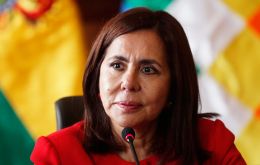
Bolivian consulates throughout Argentina were used by the Evo Morales government to promote fraud in the October 20 elections, according to the report on the case by the Organization of American States (OAS), Foreign Minister Karen Longaric announced. She added consul Ademar Valda led the operation.
-
Saturday, December 14th 2019 - 13:44 UTC
Evo Morales cries “privatization” despite terms of his asylum in Argentina
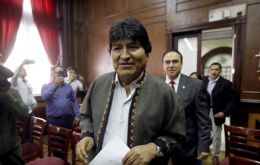
Former Bolivian President Evo Morales, now under political asylum in Buenos Aires, claimed Friday on Twitter that his country's interim government, headed by Jeanine Añez, intends to privatize companies and natural resources.
-
Thursday, December 12th 2019 - 18:17 UTC
Evo Morales and entourage in Buenos Aires to stay as a political refugees
![“We want Evo's commitment not to make any political statements [while] in Argentina,” said Solá.](/data/cache/noticias/73647/260x165/sola-evo.jpg)
Former Bolivian President Evo Morales Thursday landed at Buenos Aires' Ezeiza international airport amid tight security and top secrecy to settle in the country where he has been granted political asylum, Foreign Minister Felipe Sola told reporters. “He feels better here than in Mexico,” Solá added. “He is here to stay,” he went on.
-
Thursday, December 12th 2019 - 10:25 UTC
Bolivia’s Interim Government rejects the IACHR report on violence after elections

The Inter-American Commission on Human Rights (IACHR) published a report that describes the violence that was generated in Bolivia after the general elections as a “massacre”. For the interim government in charge of Senator Jeanine Áñez, the report is “totally biased” and “does not reflect reality.”
-
Wednesday, December 11th 2019 - 11:32 UTC
Charges against Evo Morales filed before ICC, law firm announces
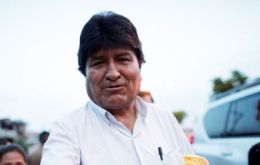
Charges for crimes against humanity against former Bolivian President Evo Morales have been filed by November 30 last before The International Criminal Court (ICC) at The Hague, a Paris-based law firm confirmed on Tuesday.
-
Friday, December 6th 2019 - 08:44 UTC
OAS confirms the Bolivian presidential election was rigged: “overwhelming evidence of malicious operations”

The Americas regional forum, Organization of American States, OAS, published details of ”deliberate“ and ”malicious” steps to rig Bolivia's October election in favor of then-President Evo Morales, who has resigned and left the country in the midst of a political uprising.
-
Wednesday, December 4th 2019 - 09:49 UTC
Bolivia creates new anti-terrorist force to dismantle foreign groups threatening the country
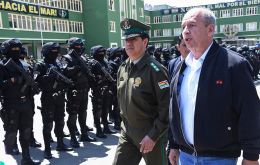
Bolivia's interim government on Tuesday unveiled a new anti-terrorism police force it said was aimed at dismantling foreign groups “threatening” the troubled country.
-
Thursday, November 28th 2019 - 09:46 UTC
Bolivian interim government implements sharp shift in foreign policy in just two weeks

Foreign policy of the interim Bolivian government foreign policy has shifted sharply in just two weeks under conservative President Jeanine Anez, a senator who took over in a power vacuum left by the resignation and exile of long-term leftist leader Evo Morales.
-
Thursday, November 21st 2019 - 09:54 UTC
Morales calls on the international community to stop a “genocide” in Bolivia
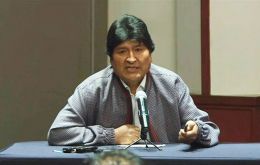
Former president Evo Morales urged the international community on Wednesday to intervene to stop what he called a “genocide” in Bolivia, where at least 32 people have died in violence that erupted after his disputed re-election.
-
Thursday, November 21st 2019 - 09:12 UTC
OAS demands an end to violence and an urgent call for elections

The Permanent Council of the Organization of American States, OAS, has called on Bolivian authorities to urgently call elections, an immediate cease of violence, and the search for dialogue.
